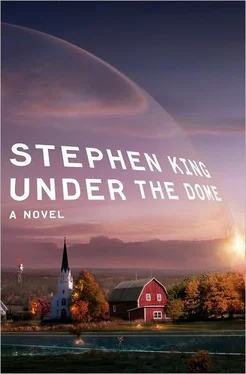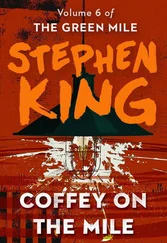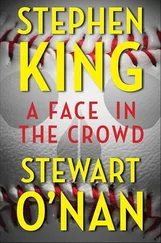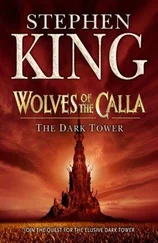“What’s burning?”
“As if you didn’t know,” Mel said, smiling. He was still pale—he must have lost a fair amount of blood—but the bandage around his head was crisp and unstained.
“Pretend I don’t.”
“Your pals burned down the newspaper,” Mel said, and now his smile showed his teeth. Barbie realized the kid was furious. Frightened, too. “Trying to scare us into letting you out. But we… don’t… scare. ”
“Why would I burn down the newspaper? Why not the Town Hall? And who are these pals of mine supposed to be?”
Mel was tucking his cock back into his pants. “You won’t be thirsty tomorrow, Barbie. Don’t worry about that. We’ve got a whole bucket of water with your name on it, and a sponge to go with it.”
Barbie was silent.
“You seen that waterboarding shit in I-rack?” Mel nodded as if he knew Barbie had. “Now you’ll get to experience it firsthand.” He pointed a finger through the bars. “We’re gonna find out who your confederates are, fuckwad. And we’re gonna find out what you did to lock this town up in the first place. That waterboarding shit? Nobody stands up to that.”
He started away, then turned back.
“Not fresh water, either. Salt. First thing. You think about it.”
Mel left, clumping up the basement hallway with his bandaged head lowered. Barbie sat on the bunk, looked at the drying snake of Mel’s urine on the floor, and listened to the fire whistle. He thought of the girl in the pickemup. The blondie who almost gave him a ride and then changed her mind. He closed his eyes.
Rusty was standing in the turnaround in front of the hospital, watching the flames rise from somewhere on Main Street, when the cell phone clipped to his belt played its little song. Twitch and Gina were with him, Gina holding Twitch’s arm as if for protection. Ginny Tomlinson and Harriet Bigelow were both sleeping in the staff lounge. The old fellow who had volunteered, Thurston Marshall, was making medication rounds. He had turned out to be surprisingly good. The lights and the equipment were back on and, for the time being, things were on an even keel. Until the fire whistle went off, Rusty had actually dared to feel good.
He saw LINDA on the screen and said, “Hon? Everything okay?”
“Here, yes. Kids are asleep.”
“Do you know what’s bur—”
“The newspaper office. Be quiet and listen, because I’m turning my phone off in about a minute and a half so nobody can call me in to help fight the fire. Jackie’s here. She’ll watch the kids. You need to meet me at the funeral home. Stacey Moggin will be there, too. She came by earlier. She’s with us.”
The name, while familiar, did not immediately call up a face in Rusty’s mind. And what resonated was She’s with us. There really were starting to be sides, starting to be with us and with them.
“Lin—”
“Meet me there. Ten minutes. It’s safe as long as they’re fighting the fire, because the Bowie brothers are on the crew. Stacey says so.”
“How did they get a crew together so f—”
“I don’t know and don’t care. Can you come?”
“Yes.”
“Good. Don’t use the parking lot on the side. Go around back to the smaller one.” Then the voice was gone.
“What’s on fire?” Gina asked. “Do you know?”
“No,” Rusty said. “Because nobody called.” He looked at them both, and hard.
Gina didn’t follow, but Twitch did. “Nobody at all.”
“I just took off, probably on a call, but you don’t know where. I didn’t say. Right?”
Gina still looked puzzled, but nodded. Because now these people were her people; she did not question the fact. Why would she? She was only seventeen. Us and them, Rusty thought. Bad medicine, usually. Especially for seventeen-year-olds. “Probably on a call,” she said. “We don’t know where.”
“Nope,” Twitch agreed. “You grasshoppah, we lowly ants.”
“Don’t make a big deal of it, either of you,” Rusty said. But it was a big deal, he knew that already. It was trouble. Gina wasn’t the only kid in the picture; he and Linda had a pair, now fast asleep and with no knowledge that Mom and Dad might be sailing into a storm much too big for their little boat.
And still.
“I’ll be back,” Rusty said, and hoped that wasn’t just wishful thinking.
Sammy Bushey drove the Evanses’ Malibu down Catherine Russell Drive not long after Rusty headed for the Bowie Funeral Parlor; they passed each other going in opposite directions on Town Common Hill.
Twitch and Gina had gone back inside and the turnaround in front of the hospital’s main doors was deserted, but she didn’t stop there; having a gun on the seat beside you made you wary. (Phil would have said paranoid.) She drove around back instead, and parked in the employees’ lot. She grabbed the.45, pushed it into the waistband of her jeans, and bloused her tee-shirt over it. She walked across the lot and stopped at the laundry room door, reading the sign that said SMOKING HERE WILL BE BANNED AS OF JANUARY 1 ST. She looked at the doorknob, and knew that if it didn’t turn, she’d give this up. It would be a sign from God. If, on the other hand, the door was unlocked—
It was. She slipped in, a pale and limping ghost.
Thurston Marshall was tired—exhausted, more like it—but happier than he had been in years. It was undoubtedly perverse; he was a tenured professor, a published poet, the editor of a prestigious literary magazine. He had a gorgeous young woman to share his bed, one who was smart and thought he was wonderful. That giving pills, slapping on salve, and emptying bedpans (not to mention wiping up the Bushey kid’s beshitted bottom an hour ago) would make him happier than those things almost had to be perverse, and yet there it was. The hospital corridors with their smells of disinfectant and floorpolish connected him with his youth. The memories had been very clear tonight, from the pervasive aroma of patchouli oil in David Perna’s apartment to the paisley headband Thurse had worn to the candlelight memorial service for Bobby Kennedy. He went his rounds humming “Big Leg Woman” very softly under his breath.
He peeped in the lounge and saw the nurse with the busted schnozz and the pretty little nurse’s aide—Harriet, her name was—asleep on the cots that had been dragged in there. The couch was vacant, and soon he’d either catch a few hours’ racktime on it or go back to the house on Highland Avenue that was now home. Probably back there.
Strange developments.
Strange world.
First, though, one more check of what he was already thinking of as his patients. It wouldn’t take long in this postage stamp of a hospital. Most of the rooms were empty, anyway. Bill Allnut, who’d been forced to stay awake until nine because of the injury he’d suffered in the Food City melee, was now fast asleep and snoring, turned on his side to take the pressure off the long laceration at the back of his head.
Wanda Crumley was two doors down. The heart monitor was beeping and her BP was a little better, but she was on five liters of oxygen and Thurse feared she was a lost cause. Too much weight; too many cigarettes. Her husband and youngest daughter were sitting with her. Thurse gave Wendell Crumley a V-for-victory (which had been the peace sign in his salad days), and Wendell, smiling gamely, gave it back.
Tansy Freeman, the appendectomy, was reading a magazine. “What’s the fire whistle blowing for?” she asked him.
“Don’t know, hon. How’s your pain?”
Читать дальше











